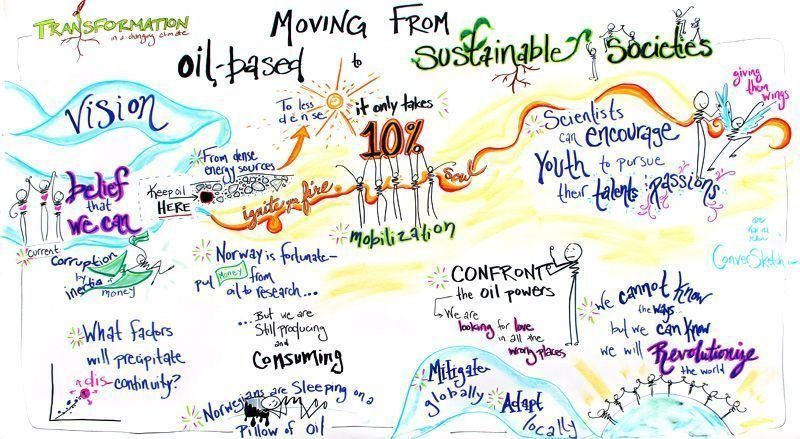
19th - 21st June 2013
Climate change is considered by many to be the greatest challenge to humanity. It is a “perfect storm” that will lead to unprecedented social and ecological impacts unless urgent measures are taken to both reduce greenhouse gas emissions and adapt to changes that are now considered inevitable. There is a growing recognition that traditional approaches and “business-as-usual” are insufficient to address the complex challenges of climate change. In fact, there have been many calls for new modes of thinking about multiple interacting processes, policies, and programs, and both scientific and policy discourses increasingly emphasize the need for deliberate transformation to address climate change.
Transformation to a low-carbon, well-adapted global society presents both opportunities and risks and raises some important questions: What do we actually mean by transformation? What do we know from historical experience in a diverse field how to make it happen? Where are the gaps in our knowledge base to inform concrete strategies and actions for deliberate, ethical, and sustainable transformation at the rate and scale that a global existential threat calls for? Can we innovate rapidly enough, and with sufficient intelligence, to transform systems along pathways toward global justice, gender equity, and long-term social and ecological resilience? Can we do this in a participative manner, without resorting to fear, force or folly?
Keynote Speakers

Paul Hawken
Paul Hawken is an environmentalist, entrepreneur, journalist, and author who has dedicated his life to sustainability, including founding ecological businesses and advising governments and corporations on environmental policy.
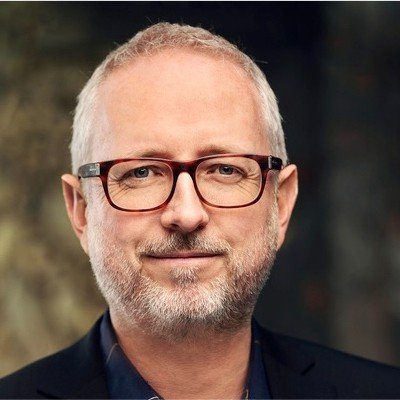
Bård Vegar Solhjell
Bård Vegar Solhjell is Norway’s Minister of the Environment and has represented Akershus County in Parliament since 2009. Within the Socialist Left Party, he serves as both Parliamentary leader and deputy leader since 2007, also being a member of its central committee since 1999.
Bill Aal
Bill Aal, an experienced developer and IT manager, leads Unconference.net, organizing participatory events. He also supports North American communities in addressing climate change and economic instability, exploring spirituality’s role through Tools for Change.
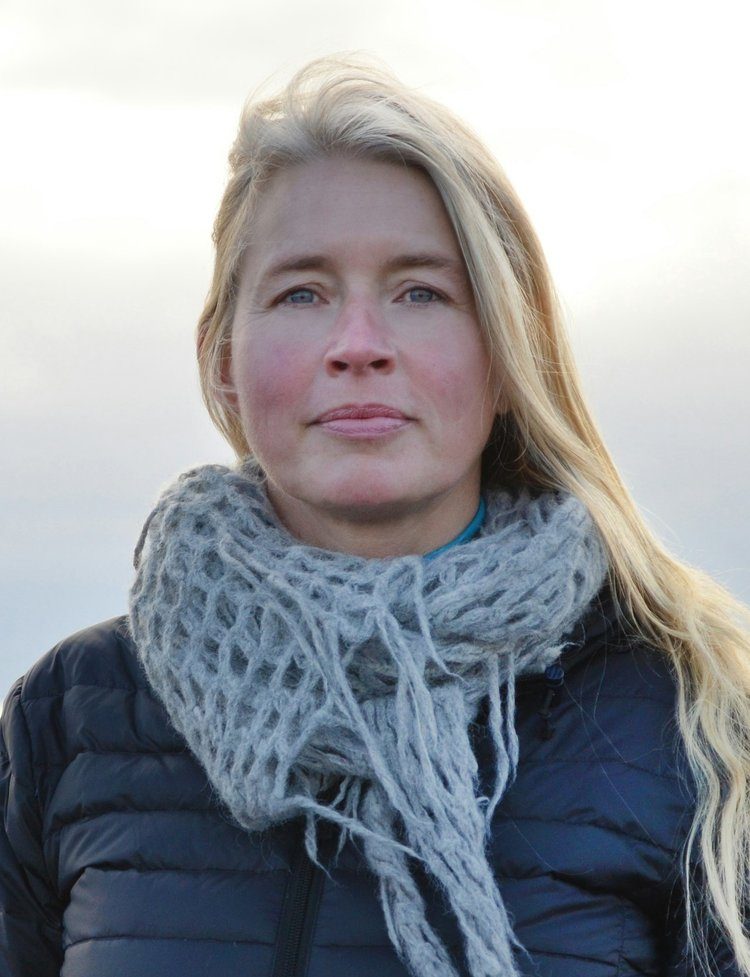
Eva Bakkeslett
Eva Bakkeslett, an artist, exhibits, lectures, and performs internationally using film, talks, and social sculpture. Holding an MA in Arts & Ecology from Dartington College of Art, she has collaborated with the University of Oslo’s Department of Sociology and Human Geography for four years.
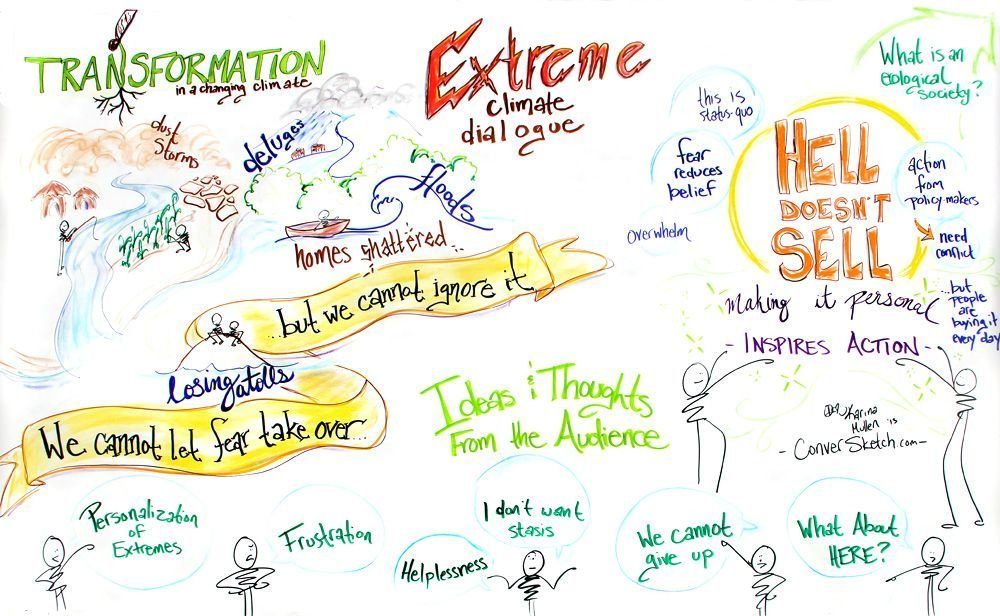
Graphic Recordings
Extreme Dialogue 1
Program
The conference held a wide range of activities and events. Its format included a combination of both conventional and unconventional conference features, with each part of the program carefully tailored to conference objectives, particularly emphasizing the need for transdisciplinary dialogue.
Themes & Questions:
The conference aimed to set the agenda for the research community, marking the first in a series on transformation. Anticipating rapid growth in related scholarship, it sought to gather the best minds to build collective knowledge, serving as a benchmark for future endeavors. Topics covered included various aspects of transformations:
💰 The Economics of Transformation
🗳️ The Politics of Transformation
🛠️ Technical and Infrastructural Transformation
🏙️ Urban Transformation
🌱 Community-based Transformation
🌟 Transformative Learning and Leadership
🌍 Social-ecological Transformation
🔄 Transformation of Values, Norms, and Worldviews
📊 Transformation of Research and Policy
📣 Transformative Communication
🎨 The Art of Transformation
The conference generated discussions that cut across themes to look at the linkages between different scales and dimensions of transformation, addressing questions such as:
🔄 What types of transformation are considered necessary?
🤔 What factors facilitate transformation in theory and in practice, across different systems, sectors, and domains?
💡 What types of capacities & competencies need to be developed to facilitate transformations that are ethical and sustainable?
🌱 How does science itself need to change, and how can new approaches to global change research contribute to the transformations of both theory and practice?
Animation:
Animation on Extremes in Climate Change
Conference 2013 Team:
Conference organizing committee:
- Karen O’Brien, Department of Sociology and Human Geography, University of Oslo, Norway
Linda Sygna, Department of Sociology and Human Geography, University of Oslo, Norway
Asuncion Lera St.Clair, CICERO Center for International Climate and Environmental Research – Oslo, Norway
Per Olsson, Stockholm Resilience Centre, Stockholm University, Sweden
Heide Hackmann, International Social Science Council, France
Eva Bakkeslett, Artist and Cultivator, UK and Norway
Scientific Advisory Board Members:
Neil Agder, Professor in Geography at the University of Exeter, UK. He researches social dimensions of vulnerability, adaptation and resilience in the face of environmental change.
Eva Bakkeslett, an artist who shows, lectures and performs her work nationally and internationally using a combination of film, performative talks and social sculpture. She holds an MA in Arts & Ecology from Dartington College of Art in England.
Jon Barnett, Professor and Australian Research Council Future Fellow in the Department of Resource Management and Geography at Melbourne University. He is a political geographer who researches the impacts of and responses to environmental change on social systems.
Frans Berkhout, Professor of Innovation and Sustainability at the Institute for Environmental Studies (IVM), VU University in Amsterdam, The Netherlands where he is also director of the Amsterdam Global Change Institute.
Barrett Brown, Integral Sustainability Center Amsterdam, the Netherlands
Rohan D’Souza, Assistant Professor at the Centre for Studies in Science Policy, Jawaharlal Nehru University (New Delhi, India). He is the author of Drowned and Dammed: Colonial Capitalism and Flood Control in Eastern India (2006).
Ioan Fazey, Professor Social Dimensions of Environmental Change Geography, School of Environment, University of Dundee, UK. He has diverse interests and an interdisciplinary background in human-environment relationships.
Chris Field, founding director of the Carnegie Institution’s Department of Global Ecology, Melvin and Joan Lane Professor of Interdisciplinary Environmental Sciences at Stanford University, and Faculty Director of Stanford’s Jasper Ridge Biological Preserve.
Carl Folke, Stockholm Resilience Centre, Sweden
Heide Hackmann, Executive Director of the International Social Science Council. Heide has worked as a science policy maker, researcher and consultant in the Netherlands, Germany, the United Kingdom and South Africa.
Bronwyn Hayward, political scientist, geographer and senior lecturer in the School of Social and Political Sciences at the University of Canterbury, New Zealand. Her focus is in the area of governments’ responsibilities to communities in a changing world.
Mark Howden, Chief Research Scientist with Australia’s national research agency, CSIRO. He leads a group of about 120 researchers in the CSIRO Climate Adaptation Flagship and is an Honorary Professor at Melbourne University, School of Land and Food.
Saleemul Huq, director of the International Centre for Climate Change & Development (ICCCAD) since 2009 and he is also a senior fellow at the International Institute for Environment & Development (IIED).
Myanna Lahsen, Senior Researcher in the Earth System Science Center at the Brazilian Institute for Space Research (INPE) and former Lecturer on Environmental Science and Public Policy at Harvard University.
Melissa Leach, STEPS Centre, the Institute of Development Studies, UK
Derk Loorbach, director of the Dutch Research Institute for Transitions (Drift) at the Erasmus University Rotterdam and associate professor in transition management.
Cecilie Mauritzen, physical oceanographer, specialising in large-scale ocean circulation and ocean heat- and freshwater uptake. She has been lead author for IPCCs Fourth and Fifth Assessment Reports, and has contributed to a wide variety of international panels.
Susanne Moser, Director of Susanne Moser Research & Consulting in Santa Cruz, California and a Social Science Research Fellow at Stanford’s Woods Institute for the Environment. Her work with local, state and federal agencies and others focuses on adaptation, communication, and science-policy interactions.
Karen O’Brien, Professor in the Department of Sociology and Human Geography at the University of Oslo, Norway. Her research focuses on climate change impacts, vulnerability and adaptation and the implications for human security.
Per Olsson, researcher and theme leader for Adaptive Governance at the Stockholm Resilience Centre. His primary research interest is in linked social-ecological system dynamics and resilience.
Mark Pelling, Professor of Geography, King’s College London. He researches on social dimensions of disaster risk management and climate change adaptation and coordinates an MA in Disasters Adaptation and Development.
Debra Roberts, Debra Roberts has worked in the city of Durban as a local government practitioner since the advent of democracy in South Africa in 1994. Her major focus areas are climate change adaptation and biodiversity planning in the African urban context.
Paty Romero-Lankao, “interdisciplinary sociologist” by training. She has been a research Scientist at the National Center for Atmospheric Reasearch (NCAR).
Paul Ryan, principal of Interface NRM, an environmental consultancy that specialises in resilience thinking, strategic planning, adaptive governance and management.
Roberto A. Sanchez Rodriguez, El Colegio de la Frontera Norte, Mexico
William Solecki, professor of geography at Hunter College and director of the City University of New York Institute for Sustainable Cities. He is also co-chair of the New York City panel on Climate Change.
Asuncion Lera St. Clair, philosopher and sociologist, is Research Director at the International Centre for Climate and Environmental Research-Oslo. St. Clair is Lead Author of the Fifth Assessment Report of the Intergovernmental Panel on Climate Change (IPCC).
J. David Tabara, works at the Global Climate Forum and is associate senior researcher at the Institute of Environmental Sciences and Technology of the Autonomous University of Barcelona. He is a member the European Sustainability Science Group.
John Thompson, has worked on power, policy and sustainability issues in food and agriculture systems for over 30 years, in both developing and industrialised countries. As a Research Fellow in the Knowledge, Technology and Society Team at the Institute of Development Studies, UK
Coleen Vogel, Extraordinary Professor (Visiting) to the School of Public Leadership, University of Stellenbosch. She was the BMW Chair of Sustainability at the University of the Witwatersrand, Johannesburg and was a previous Chair of the international scientific committee of the International Human Dimensions Programme (IHDP)
Frances Westley, University of Waterloo, Canada
TC/ESG25 | TCX-York | About TCX | Conferences | Dialogue Series | Workshops | Publications | News | Newsletters | TC’s Guiding Principles | Contact Us
Find us online!
Stay updated on the latest news from Transformations Community.
Transformations Community® 2025 • Privacy Policy

